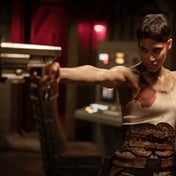
Synopsis:
In 1955 a nervous young man named John Ray Cash (Joaquin Phoenix) - Johnny to his friends - walked into the tiny Sun Studios building in downtown Memphis, Tennessee to audition for producer Sam Phillips. He and his band - a pair of out-of-work mechanics - wore black because it was the only colour shirt they all owned. By 1968 Johnny was one of music's biggest stars - affectionately called "The Man in Black" - with dozens of hits and millions of fans. But that success came at a price. A failed marriage and a long battle with drug addiction meant that many had written Cash's career off. With the help of June Carter (Reese Witherspoon) - his best friend, muse and, eventually, wife - he remerged to record one of the most daring and brilliant live albums in history - At Folsom Prison. This is the story of his journey from his birth in rural Arkansas, through his struggles first to win fame and then to tame it, culminating in his triumph over the dark, self destructive urges that drove him, as he put it, "into a burnin' ring of fire".
Review:
Walk The Line is a beautifully crafted film that thrills and inspires without sacrificing any authenticity along the way. It is myth making at its very best - the true story of a musical genius rescued from the black pit of despair by the redemptive power of love. It is also a good old-fashioned piece of entertainment, full of humour, candour and marvellous music.
Writer / director James Mangold had a lot of help from history in producing such a compelling tale. Cash's story would seem conventional to the point of cliche - if it weren't all true. But Mangold and co-writer Gill Dennis deserve credit for their canny choice of focus. Instead of trying to squeeze Cash's entire 73-year life into two hours they concentrate instead on his early years, his struggle with addiction and his long courtship with his second wife, musician June Carter.
As helpful as history has been, there are plenty of equally compelling life stories that have fallen flat on the big screen. One thing that setsWalk The Line apart is the obvious love and respect the filmmakers have for their subject. Mangold spent seven years developing the film, working with Johnny, June and their children. More tellingly Mangold managed to instill his own love and reverence for the story in every person working on the film - and this emotion is transmitted wholesale to the audience.
But, despite his reverence, Mangold never shies away from presenting the real J.R. Cash - warts and all. It is this careful balance between myth making and historical reality that keeps the film from slipping into melodramatic hero worship. Like Ray Charles in the equally brilliant biopic Ray, Johnny earns our respect, it isn't simply taken for granted.
One of the film's greatest treats is its electrifying musical performances. Phoenix and Witherspoon sing every note themselves and do an extraordinarily good job of it - particularly considering neither of them had any training prior to the film. Far from detracting from Cash and Carter's musical legacy, these heartfelt performances give the movie a sense of authenticity that miming or lip synching could never have hoped to achieve. What's more it lends the actors a deeper connection to the movie - their performances have a tension and a vulnerability that is as endearing as it is thrilling.
The offstage performances are equally good. Phoenix and Witherspoon are both accomplished actors and this is some of their best work to date. Phoenix seems to have an inborn sense for the rhythms of real speech and movement. He is a deeply instinctive actor who seems to inhabit his roles entirely. But despite the apparent ease with which he acts, you can sense a fierce intelligence and an eye for detail in every second he is on screen.
Witherspoon's performance is another sign that her formidable talent continues to blossom. It has none of the preciousness or cuteness that characterized her earlier roles. In Walk The Line she is finally a grown woman - sensitive but strong, loving but firm and vulnerable but never weak. She has said that her own professional life is very like June Carter's - always ditzy in front of an audience, always sensible away from one. We get a sense that some of the "real" Reese is sneaking through onto screen and the movie is all the better for it.
One other performance worth noting is Johnny's authoritarian father, Ray, played by Robert Patrick. Many will remember him for his superb physical performance as T-1000 in James Cameron's Terminator 2 and he brings much of the same steely eyed intensity to his role here. Patrick has a talent for playing unpleasant roles well, and we can hope that this performance wins more work for this talented character actor.
Walk The Line has its share of faults. It is perhaps a little long and some Cash purists have complained that it leaves out far too much important material in favour of more convenient details. The film can also make no claims about a lack of bias. It may not conceal any dirt, but it is an overwhelmingly positive picture of Cash. Whether or not this matters is something moviegoers will need to decide for themselves.
Whether you agree with its sentiments or not, there's no denying the quality of the filmmaking. This is biography at its lucid, beautiful and inspiring best. Instead of obsessing about historical exactitude and creating a dry museum piece, Mangold has crafted a living, breathing work of art.
- Alistair Fairweather




 Publications
Publications
 Partners
Partners










